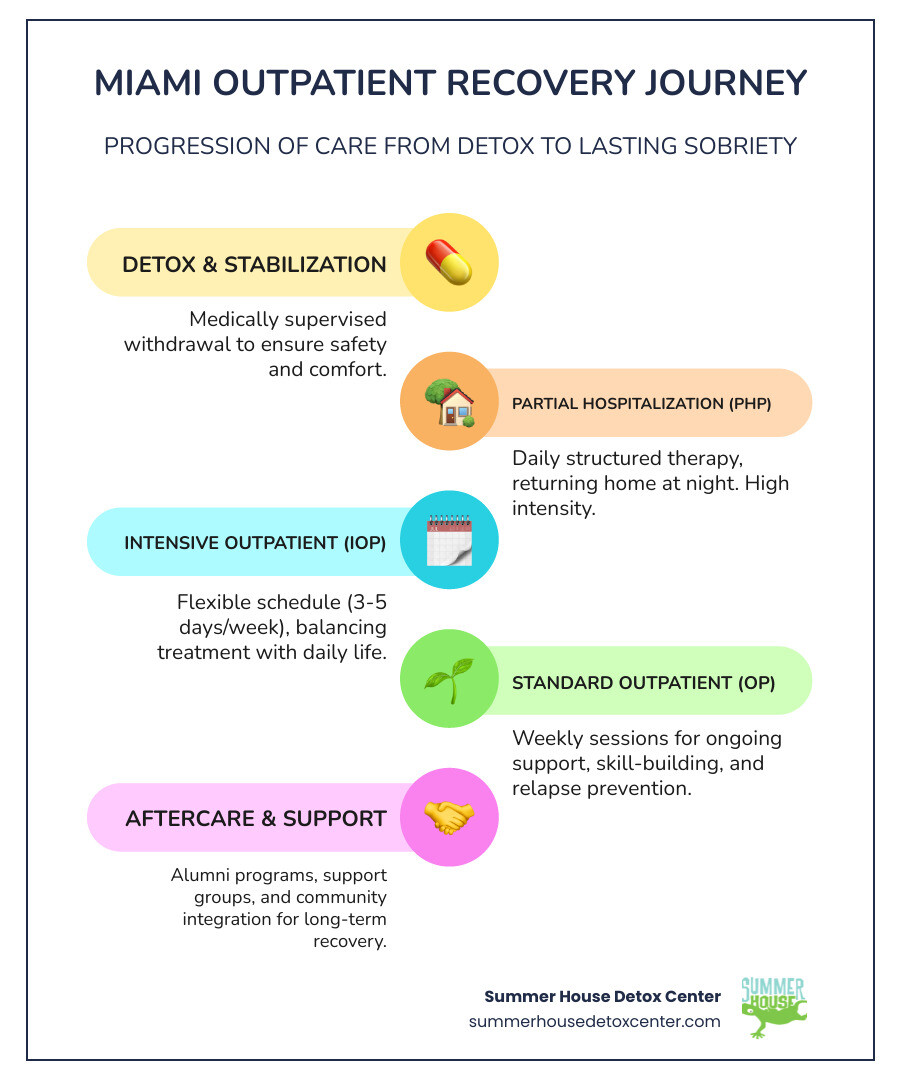Why Outpatient Drug Rehab Miami is Your Gateway to Recovery
In the vibrant, environment of Miami, balancing personal well-being with daily obligations can be a challenge. When addiction enters the picture, it can feel impossible. This is where outpatient drug rehab Miami programs offer a guide of hope. They provide a flexible, effective path to recovery that integrates seamlessly into your life, allowing you to heal without putting your career, education, or family commitments on hold. These programs deliver professional addiction treatment through structured, scheduled therapy sessions, all while you continue to live in the comfort and familiarity of your own home.
Top Miami Outpatient Rehab Options:
- Intensive Outpatient Programs (IOP) – IOPs offer a significant level of care, typically requiring clients to attend sessions 3-5 days per week for 3-4 hours each day. This structure is ideal for individuals who need more support than standard outpatient care but have a stable home environment.
- Standard Outpatient Programs (OP) – As the least intensive level of care, standard outpatient programs involve 1-2 sessions per week. They are perfect for those stepping down from a higher level of care or for individuals with milder substance use disorders who need ongoing support and relapse prevention skills.
- Partial Hospitalization Programs (PHP) – The most intensive form of outpatient care, PHPs run 5 days a week for several hours a day, mirroring the intensity of a residential program. It’s an excellent option for those who need daily structure but can return to a supportive home each evening.
- Evening Programs – Designed specifically for working professionals and students in Miami, these programs offer the same high-quality therapy as daytime programs but with a schedule that accommodates a 9-to-5 job or university classes.
Key Benefits:
- Continue Working or Attending School: Outpatient treatment’s flexibility means you don’t have to choose between your recovery and your responsibilities. You can schedule therapy around your existing commitments, maintaining financial stability and career momentum.
- Stay Connected with Family Support Systems: Healing within your home environment allows you to practice new communication skills and rebuild trust with loved ones in real-time. Family can be an integral part of the recovery journey, and outpatient care facilitates their involvement.
- More Affordable Than Residential Treatment: By eliminating the costs associated with room, board, and 24/7 staffing, outpatient programs are a significantly more affordable option, making high-quality care accessible to more people.
- Access Miami’s Vibrant Recovery Community: Miami-Dade County has a strong, diverse, and active recovery community. Outpatient treatment allows you to connect with local support groups, sober activities, and peers who understand the journey, building a network that will support you long after treatment ends.
If you’re struggling with addiction but can’t commit to residential treatment, outpatient programs in Miami-Dade County provide comprehensive care through evidence-based therapies, dual diagnosis treatment, and personalized recovery plans.
Many people carry “fear, guilt, and the weight of past pain” when seeking help. Miami’s best outpatient centers understand this and focus on treating you as a whole person—not just your addiction. These programs are designed to be safe, non-judgmental spaces where you can address co-occurring conditions like depression, anxiety, and PTSD. By doing so, you not only stop using substances but also build the emotional resilience and coping skills needed for lasting sobriety.
The journey to a healthier life often starts with a simple, confidential phone call. A conversation with an admissions specialist can help you explore your options, understand the different levels of care, and verify your insurance coverage. Most major health insurance plans cover outpatient addiction treatment under federal healthcare mandates, making it easier than ever to get the help you deserve.

Simple guide to outpatient drug rehab miami terms:
Understanding Outpatient Drug Rehab in Miami
Making the decision to seek addiction treatment can feel overwhelming, especially when you’re trying to balance recovery with work, family, and daily responsibilities. That’s where understanding your options becomes crucial, and outpatient drug rehab Miami programs offer a path that might be exactly what you need. This model of care is designed to fit into your life, rather than requiring you to step away from it entirely.
What is Outpatient Drug Rehab?
Outpatient drug rehab allows you to receive professional addiction treatment while continuing to sleep in your own bed each night. Instead of living at a treatment facility 24/7, you attend scheduled therapy sessions, workshops, and medical appointments at a clinic, then return home. This structure allows you to immediately practice what you’ve learned—new coping mechanisms, communication skills, and relapse prevention techniques—in real-world situations.
This approach works particularly well if you have a stable and supportive home environment. This means having a safe living space, free from major triggers or individuals who are actively using substances. Maybe you’re a parent who can’t leave your children, a professional who needs to maintain their career, or a student in the middle of a semester. Outpatient treatment recognizes that life doesn’t pause for recovery; instead, it helps you weave healing into your existing routine.
In Miami, these programs are designed with flexibility in mind. You’ll attend scheduled therapy sessions that fit around your commitments, whether that’s during lunch breaks, evenings, or weekends. The beauty of this model is that you immediately get to test your new skills. For example, you might learn a technique for managing cravings in a group session and then use it that very evening when you face a trigger at home.
The ideal candidate profile for outpatient treatment includes someone who has already completed medical detox (if necessary), has stable housing, and demonstrates a strong internal motivation for change. It’s crucial that the individual is not at risk for severe or life-threatening withdrawal symptoms that would require 24-hour medical supervision. You don’t need to have everything figured out, but a genuine readiness to show up, be honest, and do the work is essential for success.
For those considering their options, exploring comprehensive Drug Rehab Miami services can provide valuable insight into the full spectrum of available care, from initial detox to ongoing outpatient support.
Outpatient vs. Inpatient Detox and Rehab: Key Differences
Choosing between outpatient and inpatient care isn’t about which is “better”—it’s about which is the right fit for your specific clinical needs, life circumstances, and recovery goals. A professional clinical assessment is the best way to determine the appropriate level of care, but understanding the fundamental differences can help you start the conversation.
| Feature | Outpatient Treatment | Inpatient Treatment |
|---|---|---|
| Living Arrangement | Stay at home with family | Live at treatment facility |
| Treatment Intensity | 1-5 days per week, 1-4 hours | 24/7 structured environment |
| Daily Flexibility | Continue work/school/family duties | Full focus on recovery |
| Cost | More affordable, insurance-friendly | Higher cost, longer insurance approval |
| Best Suited For | Stable home life, completed detox | Severe addiction, unsafe home environment |
Living Arrangement & Environment: The most obvious difference is where you live. Outpatient care allows you to remain at home, which can be beneficial for those with strong family support. Inpatient treatment provides a highly structured, substance-free environment, removing you from daily triggers and stressors to focus solely on healing. This is critical for individuals whose home life is unstable or unsupportive of recovery.
Treatment Intensity & Structure: Inpatient programs offer round-the-clock support and a rigid daily schedule of therapy, education, and activities. This immersive experience is designed to stabilize individuals in acute crisis. Outpatient programs, while still structured, offer focused treatment sessions for a set number of hours per week. This allows for more autonomy and requires a higher degree of personal accountability.
Daily Flexibility: This is the hallmark of outpatient care. The ability to attend your daughter’s soccer game, meet a deadline at work, and still receive professional addiction treatment is a major advantage. This continuity often makes the transition from active treatment back to “normal life” much smoother because you’ve been practicing recovery skills in that environment all along. Inpatient care requires putting life on pause, which is a necessary sacrifice for many to build a solid foundation.
Cost and Insurance: The cost difference is substantial. Because outpatient treatment does not include housing, meals, or 24/7 staffing, it is significantly less expensive. Most insurance plans readily cover various levels of outpatient care under federal mandates like the Mental Health Parity and Addiction Equity Act (MHPAEA).
Signs You or a Loved One May Need Treatment
Sometimes the hardest part isn’t finding treatment—it’s recognizing and admitting that it’s needed. Addiction is a progressive disease that often convinces the person suffering that everything is under control, even as their world solves.
Behavioral Changes: These are often the first red flags. Secrecy becomes a new norm—hiding substances, lying about whereabouts, or having hushed phone calls. You might notice a loss of interest in hobbies and activities that were once important. Financial troubles may also appear, such as borrowing money frequently or being unable to account for large sums of cash.
Neglecting Responsibilities: As addiction takes a firmer hold, essential duties fall by the wayside. Work performance suffers due to missed days or poor focus, leading to warnings or job loss. At home, bills may go unpaid, and household chores are ignored. For parents, this can manifest as forgetting to pick up children from school or missing important events.
Relationship Strain: Addiction drives a wedge between people. Arguments with family and friends about substance use become more frequent and intense. You may find yourself withdrawing from loved ones to avoid judgment or conflict, or conversely, lashing out in defensiveness. Healthy relationships require presence and honesty—two things addiction systematically destroys.
Failed Attempts to Quit: Perhaps the clearest sign that professional help is needed is having tried to stop or cut back on your own, only to fail repeatedly. If you’ve made promises to yourself or others that you’ll quit, but find yourself returning to substances despite negative consequences, you’re not weak. You’re dealing with a complex medical condition that requires clinical intervention.
Physical and Mental Health Decline: The body and mind keep score. Physical signs can include dramatic weight loss or gain, poor personal hygiene, constant exhaustion, bloodshot eyes, and a decline in overall appearance. Mentally, you may experience increased anxiety, paranoia, depression, or unpredictable mood swings that are directly linked to your substance use.
If these signs feel painfully familiar, know that seeking help is a sign of profound strength. Miami offers excellent resources for those ready to take that next step, including specialized Miami Substance Abuse Treatment programs designed to meet you exactly where you are in your journey.
The path to recovery doesn’t have to mean turning your entire life upside down. With the right outpatient program, you can begin healing while staying connected to the people and responsibilities that matter most to you.
